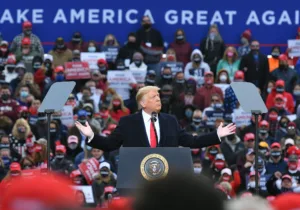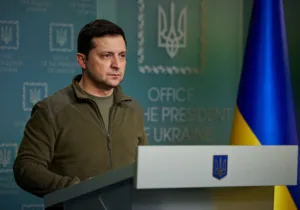Many sighed in relief when GOP leader Kevin McCarthy (R-CA) finally grabbed the House Speaker’s gavel on his fifteenth try. His victory, however, provides little comfort to Ukrainians and the supporters of their cause around the world. The arrangement McCarthy arrived at with the Freedom Caucus to secure its support remains shrouded in mystery. But we need not speculate about the deal’s details to discern what McCarthy’s speakership may portend for future U.S. support to Ukraine.
We know that prominent members of the Freedom Caucus, modern-day Jacobins in conservative clothing, have promised to suspend aid. After spoiling several votes for a new speaker, Florida Rep. Matt Gaetz tweeted the score as he saw it: “Biggest loser: Zelensky” — “Biggest winner: US Taxpayers.” Georgia Rep. Marjorie Taylor Green, who lent her support to McCarthy early on, has pledged, “[u]nder Republicans, not another penny will go to Ukraine.” If Republicans are not united behind McCarthy, a good many seem at least united behind blocking future aid to Kyiv. Unsurprisingly, Speaker McCarthy has signaled his allegiance to this pledge. “There go the people,” McCarthy figures, and “I must follow them, for I am their leader.” In the Senate, too, Josh Hawley (R-MO) is hopeful that, with the arrival of freshman senators like J.D. Vance (R-OH), Republicans can thwart future Ukraine aid bills.
The November mid-term elections swept into Congress several new members of the so-called “new right” – a populist, neo-isolationist, often Putin-sympathetic wing of the Republican Party. What they lack in governing vision they make up for in reading the popular pulse. Up from a mere single-digit percentage in March of last year, recent polling shows that nearly half of Republican voters now agree that “the U.S. is providing too much support to Ukraine.”
Thus, the problem is that many Republicans, leaders and voters alike, have forgotten their conservative roots — a point that worries conservatives in Ukraine. The germ of modern conservatism, Edmund Burke’s Reflections on the French Revolution, after all, was literally born out of the conviction that what happens over there matters right here at home. There are varieties of American conservatism, of course. And there are varieties of conservative American foreign policy. But no foreign policy has a claim to the conservative creed that outright ignores or rejects Burke’s admonitions.
Burke wrote his treatise indicting the French Revolution in 1790, and a lengthy follow-up the next year, while serving in the British Parliament. What inspired a busy statesman to invest such time and effort into diagnosing and condemning political upheaval erupting across the English Channel? Simply put, Burke saw it as a national-security imperative. He feared that, unless contained or extinguished, the fires sweeping Paris would eventually burn constitutional monarchy to the ground in London.
At just the moment that men were first becoming self-aware of ideological differences, and thus discovering a non-materialist basis for identifying threats, Burke presciently observed what the French Revolution foretold in his own country.
Because he sensed early on how this yet-unnamed phenomenon of ideology could proliferate, he wrote Reflections to quell mounting British support for the French project aimed at overthrowing the tried-and-true ways of constitutional monarchy. Burke feared not only that French revolutionaries would spread their ideology by military force – which they did, on battlefields spanning from Haiti to Egypt – but also that his own countrymen would subvert the British order from within. “[A]s long as the desperate System which prevails in France can maintain itself,” Burke would write a friend in 1792, “we shall always find some eruption or other here.”
The perceived success of France’s liberal regime – what political scientists today call “demonstration effects” – would propel the Revolution right across Britain’s wall of water. Recognizing that “we are divided from you” in France “but by a slender dyke of about twenty-four miles,” Burke took pains to convince his French pen pal (and his true audience, the British Parliament and Crown) that “not one in a hundred amongst us participates in the ‘triumph’ of the Revolution Society,” the home of British Jacobinism some of his colleagues frequented.
In 1790, the revolutionaries in France were gaining enthusiasts across Britain, even in Burke’s own Whig party. Today, admiration for Putin’s Russia – coming from the putative leader of the Republican Party, Donald Trump, the darling of the entertainment wing of the Party, Tucker Carlson, and others – is similarly gaining momentum on the American right. That Senate GOP leader Mitch McConnell felt compelled to clarify that arming Ukraine “is the number one priority for the United States right now according to most Republicans” shows just how uncertain Republican support for Ukraine really is.
The neo-isolationist right decries America’s exercise of “liberal imperialism” over the globe. American meddling, they argue, deprives societies and the “little platoons” within them of the opportunity to chart their own organic and sovereign course. Some would have the decadent America resign its leadership role. For his pretend preservation of European Christendom and genuine suppression of progressive causes, many on the American right today view Putin’s Russia as a model for restoring faith, family, and nation in political life.
But don’t be fooled by their Burkean wordplay. As Reflections shows, Burke knew developments in one nation could never be divorced from the fate of his home nation, and that what appears promising is more often a plague. Before the revolutionaries captured the French Estates-General in 1789, he conceded to his interlocutor, “your affairs were your concern only” and Englishmen were “kept aloof from them, because we were not citizens of France.” However, Burke continued: “Where we see the model held up to ourselves” in England, “your affairs … are made a part of our interests.”
The limit of Burke’s respect for French sovereignty was his conviction that national change of such an abrupt and capacious character could not be confined to its place of origin. Perfectionist ideologies – from 18th-century rationalist French revolutionaries to 19th and 20th-century Marxists – are transnational proselytizers that must be contained before their contagion demolishes our own institutions. “If [the revolution] be a panacea, we do not want it,” Burke wrote in his Reflections. “If it be a plague,” the more likely diagnosis in Burke’s mind, “it is such a plague, that the precautions of the most severe quarantine ought to be established against it.”
An ideological rival with expansionist ambitions, thought Burke, had to be contained. Allowing it to fester, mature, and metastasize would only expose allies and the homeland to a more powerful threat in the future.
Putin is not an ideologue in the mold of Lenin, but he does seek to export an authoritarian model through firepower. What made the French project so threatening to Burke’s England was that the revolutionaries’ conception of “liberté, égalité, fraternité” was a frontal assault on the foundations of English government: inherited wisdom, customs, and institutions. Putin’s Russia is similarly antithetical to the American way of life. As Richard Lowry has observed, Putin’s resurrection of the tsarist Russia creed, “Orthodoxy, autocracy, and nationality” is “a trinity alien to the American project.” And like the French revolutionaries, Putin proves the mettle of his ideology by remaking other nations in its likeness.
A year after publishing Reflections, Burke put a finer point on it in his Thoughts on French Affairs. “[A]s long as [the Revolution] exists in France, it will be in the interests of the managers there to disturb and distract all other governments . . .” And like a disease, “the longer the present system exists, the greater will be its strength; the greater its power to destroy discontents at home, and to resist all foreign attempts in favor of these discontents.”
The conservative response was clear to Burke. Since “no counter-revolution is to be expected in France, from internal causes solely,” the lovers of tradition, order, and stability would have to contain, if not eradicate, the contagion from the outside. Around the same time, in a letter to a member of the French National Assembly, Burke likened the assemblymen to “madmen” who, “like other madmen, must be subdued” by some “power” that “must come from without.” Up until his death, Burke continued to plead for foreign military intervention to impede the militant ideology that would go on to instigate wars across the world.
The United States has a chance to help a power “from without,” the Ukrainian military, subdue the conventional capability of a long-time adversary. Because the U.S. military is not currently equipped to prosecute a two-theater war, conservatives should seize this chance to eliminate one of our two major geopolitical challengers on the cheap. Moreover, proving that America and her allies can serve as the arsenal of democracy in the twenty-first century is the clearest way to deter Chinese designs on Taiwan.
Until recently, Republicans would require little convincing. This is because they understood, as Walter Lippmann explained decades ago, that contesting authoritarians abroad was the shield of our republic. But the Republican Party is not in Kansas anymore. Yet in another sense, it’s stuck in Kansas, unable to recognize that what happens in faraway Kyiv does have direct and predictable consequences for Americans. Although Sen. J.D. Vance brags that he doesn’t “really care what happens to Ukraine,” Ohioans would be foolish to pretend that soaring gas and food prices are unrelated to embargoes on Russian oil and the Russian-imposed blockade of Ukrainian grain exports.
Acknowledging the U.S. interests at stake does not require compromising any conservative principles. Conservatives can and should demand more accountability from the Biden administration. Conservatives should require congressional oversight of the hard-earned taxpayer dollars sent to Kyiv and that our European allies pay their share for European security. They should demand that President Biden explain to the American people what it at stake, and that he place America’s security before Ukraine’s. Putting “America first” has always been the duty of the commander-in-chief. Conservatives cannot, however, act like this war is of no consequence to Americans.
As Sen. McConnell (R-KY) recently affirmed, material support to Ukraine is not only “morally right,” but “also a direct investment in cold, hard, American interests.” Preeminent among those interests is preventing the contagion of authoritarianism from spreading across Europe and from subverting our own republican government.






